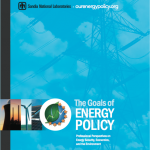63 item(s) were returned.
According to a national survey of energy professionals jointly prepared by Sandia National Laboratories and OurEnergyPolicy.org, U.S. energy policy should simultaneously pursue energy supply security, economic outcomes, and minimized environmental impacts. Contemporary political discourse often poses energy policymaking as a binary decision—the economy versus the environment, for example. Public opinion polls frequently support this conception, posing energy policymaking options as a zero-sum game between two opposed goals. However, does this tension in the discourse accurately reflect how policy is made? Do energy professionals — people working on energy issues daily — view U.S. energy policy in this way? How might professional insights… [more]
View InsightMember
U.S. House of Representatives
Along with Rep. Yvette Clarke (D-NY), Rep. Trent Franks (R-AZ) and Rep. Hank Johnson (D-GA), I recently introduced H.Res.762, with which we mean to express “the sense of the House of Representatives regarding community-based civil defense and power generation.” The Resolution is intended to “encourage community based civil defense preparations, including distributed generation of 20% of local electricity needs.” The U.S. electric grid is one of our nation’s most critical infrastructures—none of the other 17 critical infrastructures will function properly without it. America’s grid is vulnerable to widespread blackouts of extended duration from any and all of the following threats:… [more]
View InsightIn an August 5th op-ed, the New York Times’ Thomas Friedman urges America to “Get It Right On Gas.” While noting domestic natural gas development’s potential to address a host of energy policy issues – the trade imbalance and job creation, greenhouse gas emissions, and energy security – Friedman quotes Energy Innovation’s Hal Harvey in asking if natural gas offers “a transition to a clean energy future, or does it defer a clean energy future?” “A sustained [natural] gas glut could undermine new investments in wind, solar, nuclear and energy efficiency systems – which have zero emissions – and thus… [more]
View InsightHouse leadership is planning a vote this week on a bill to expand leasing for offshore drilling, the “Congressional Replacement of President Obama’s Energy-Restricting and Job-Limiting Offshore Drilling Plan” (H.R. 6082). As E&E News reports, the bill would “expand future offshore leasing to almost all of the Atlantic Ocean, the southern Pacific and Alaska’s Bristol Bay, all areas that were excluded from Interior’s final five-year leasing plan.” The bill would also double the number of sales in the Department of Interior’s plan and accelerate by three years sales Interior plans in Alaska’s Chukchi and Beaufort seas. Some have criticized the… [more]
View InsightIt seems difficult to find areas of consensus on energy policy these days. For example, energy efficiency once received significant bipartisan support. That’s no longer the case. Most agree that energy security is a worthwhile goal. However, each Congress, a vast number of pathways toward improved energy security are advocated – tighter fuel standards, expanded domestic oil production, clean energy standards, more nuclear, less nuclear, electric vehicles, natural gas vehicles, flex fuel vehicles, etc. – and very few, if any, achieve lasting, multi-stakeholder, bipartisan support. In his recent book, “Power Plays: Energy Options in the Age of Peak Oil,” energy… [more]
View InsightCoal is one of America’s most abundant and affordable energy sources, and has served for decades as the country’s primary base load electric fuel. Coal comes with significant environmental trade-offs, including local air and water pollution, deforestation, and mountaintop removal from mining process, and greenhouse gas and toxic particulate emissions from burning it to generate electricity. Given plentiful U.S. supplies of low-cost coal, there is clear economic and energy security rationale for continuing to use coal, and government and industry have worked for years to promote and demonstrate “clean coal” technologies. It is hoped that these technologies will capture CO2… [more]
View InsightRecent increases in U.S. natural gas and oil production – increases dramatic enough to drive speculation about and calls for U.S. exports of these resources – have brought the prospect of an energy self-sufficient U.S. into sight, while geopolitical and market volatility around the globe continue to make energy independence an attractive policy goal. However, the question remains: Would U.S. energy independence necessarily mean U.S. energy security? According to a report from Securing America’s Future Energy, The New American Oil Boom: Implications for Energy Security, “energy security,” defined as our economy’s ability to withstand shocks to energy supply, is too… [more]
View InsightOn Thursday, June 14th the bipartisan House Oil & National Security Caucus — co-chaired by Rep. Jack Kingston (R-GA) and Rep. Eliot Engel (D-NY) — and OurEnergyPolicy.org hosted a fantastic panel discussion called Gas Prices & National Security. The panelists included former Director of Central Intelligence R. James Woolsey, American Enterprise Institute scholar Kenneth P. Green, and Bloomberg Government energy analyst Rob Barnett. What do you make of the panelists arguments? What is the relationship between gasoline prices and national security? Are national security concerns sufficient grounds to rewire America’s liquid fuels infrastructure?
View InsightLast month, the National Alliance for Advanced Technology Batteries released “Distributed Energy Storage: Serving National Interests,” a white paper which outlines the benefits of distributed energy storage (DES) and its relationship to the nascent electric vehicle (EV) industry. According to the paper, DES systems can increase grid reliability, stability and security because of their “ability to provide… electric supply capacity and energy time shift, ancillary services, transmission and distribution (T&D) system support, electric utility customer energy cost management, and renewable energy integration.” These advantages may be necessary if the U.S. were to increase integration of renewable energy sources, see a… [more]
View InsightThe House Armed Services Committee’s newly proposed 2013 Pentagon budget contains a provision that would prevent the U.S. Department of Defense (DoD) from purchasing alternative fuels, largely in the form of biofuels, if they cost more than traditional fuels. The proposal comes at a time when the military is ramping up its use of biofuels and the U.S. biofuel industry could use the certainty provided by a customer as large and influential as DoD. An example of DoD’s alternative fuels efforts: In 2009, the navy announced a plan that would have the navy utilize 50% non-oil energy in its operations… [more]
View Insight
